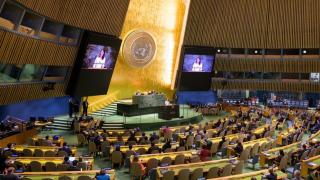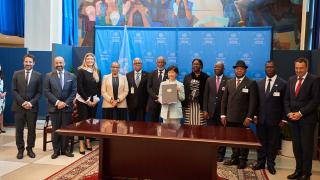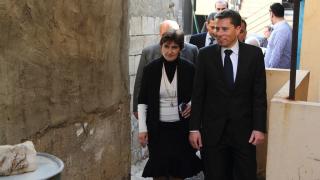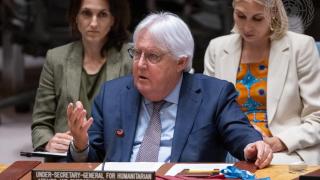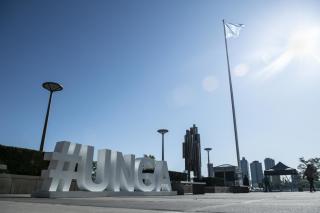
What is UNGA?
The UN General Assembly (UNGA) is one of the main bodies of the United Nations. It is the only UN forum in which all members receive equal representation, and as such it is the main debating chamber of the UN.
It is also responsible for the UN’s budget, for the membership of the UN, and for electing and appointing other important roles within the UN, such as the members of the Human Rights Council, the non-permanent members of the UN Security Council and (in principle) the UN Secretary-General.
Unlike resolutions of the Security Council, resolutions of the General Assembly are non-binding on states but, as well as putting the thoughts of the world on record, they can be great motivators for action, particularly within the UN system: commissioning reports, finding funds and establishing offices and processes.
When does it meet?
The UN General Assembly meetings are divided into annual sessions which start every year in late September. The latest session, the 77th, began on 13 September. The sessions then run for almost a year.
However, the phrase UNGA is often used as a synecdoche for the “annual general debate” and sometimes the “high level plenary meeting” that take place in weeks 2 and 3 of the session. Week 2 is often referred to as “UNGA week” because this is when world leaders make speeches. In addition, important announcements and events involving high-profile participants such as CEOs and celebrities are timed to take place during this week. This year’s General Debate, which runs through 26 September, is expected to be fully in-person.
One of the largest meetings of world leaders annually, UNGA week is an important part of the diplomatic calendar, providing ample opportunity for negotiations and discussions in the corridors of the UN headquarters.
This year’s theme “A watershed moment: transformative solutions to interlocking challenges” was chosen by the new President of the General Assembly, Csaba Kőrösi of Hungary. The theme is often broad in order to avoid constraining leaders’ speeches.
UNGA week tends to attract a lot of media attention, but the real work of UNGA takes place during the rest of the year, so we strive to support journalists and the public in continuing to follow the more substantive developments at the UN throughout the year.
Timetable and Committees
The session started on Tuesday 13 September 2022. The start of the session includes a moment of silent reflection, and an address from the Secretary-General and the new President of the General Assembly.
At the start of the session the General Assembly will form a General Committee consisting of the President, Vice Presidents, and committee chairs. They come up with a draft programme of work, which is then voted on by the General Assembly.
This programme of work divides up the tasks of the General Assembly between its main body and its six committees:
- The First Committee: Disarmament and International Security (DISEC)
- The Second Committee: Economic and Financial (ECOFIN)
- The Third Committee: Social, Cultural, and Humanitarian (SOCHUM)
- The Fourth Committee: Special Political and Decolonisation (SPECPOL)
- The Fifth Committee: Administrative and Budgetary and General
- The Sixth Committee: Legal
Each UN member can have a representative on each Committee. These Committees, led by their chairs, work up proposals which they present to the General Assembly for a vote. The President of the General Assembly, in consultation with the General Committee, is responsible for managing the workload of the whole.
On most issues, both within a committee and within the main or “plenary” session of the General Assembly, a simple majority vote of those in attendance is required, but some more substantive or important issues, such as admitting a state to UN membership, require a two-thirds majority.
Key events:
- 16, 17 & 19 September - Summit on Transforming Education, to mobilise political ambition, action, solutions and solidarity to transform education and to take stock of efforts to recover pandemic-related learning losses
- 19 September - SDG Moment, the second of the Decade for Action, will seek to reinforce the 2030 Agenda and report on progress, with a focus on hunger, poverty and climate
- 20 - 26 September - General Debate, where Heads of State and Government explore solutions to the intertwined global challenges under the theme, “A watershed moment: transformative solutions to interlocking challenges.”
- 21 September - High-level meeting to mark the commemoration of the 30th anniversary of the adoption of the Declaration on the Rights of Persons Belonging to National or Ethnic, Religious and Linguistic Minorities
- 21 September - Leaders’ Roundtable on Climate Action, a closed discussion held by the Secretary-General and the President of Egypt, aims for a frank and informal exchange in the lead-up to COP27.
- 22 September - UN Security Council High-Level Debate on Ukraine, where world leaders will discuss the situation in Ukraine. The debate will be livestreamed on UN Web TV.
- 23 September - Event on Ending the COVID-19 pandemic, through equitable access to vaccines, tests and treatments. The UNSG, WHO and UNICEF, along with the support of ACT-A partners will focus on mobilising additional political support to effectively end the pandemic
- 23 September - The Inaugural Kofi Annan Lecture will be delivered by Prime Minister Mia Mottley of Barbados. The event, co-hosted by the Kofi Annan Foundation, International Peace Institute (IPI), Crisis Group and Open Society Foundations, will be live-streamed on the IPI website.
- 26 September - High-level plenary meeting to commemorate the International Day for the Total Elimination of Nuclear Weapons
You can find a comprehensive list of all the meetings taking place here.
To follow the up-to-date schedule of daily meetings, check out the UN Journal, which is updated every morning. It contains information on the meetings of the day and forthcoming meetings, including:
- Official meetings (summaries will be added after the meetings, where applicable)
- Informal consultations
- Other meetings
- Forthcoming meetings
Also don’t miss the UN delegates handbook that gives an overview for participants in UNGA of the ways the UN is encouraging UNGA interactivity.
The order of speakers for the General Debate can be found here. This is a provisional list, we will share any updates as and when they come.
By tradition Brazil goes first (Brazil’s delegates were very effective in the very first few General Assembly sessions in getting to the podium first, and the tradition stuck!). Usually, as host, the US goes second, though this year Joe Biden will speak on Wednesday after attending Queen Elizabeth II's funeral. After that, speaker order is by negotiation, but Heads of State (Presidents and Kings) tend to go first, followed by heads of government (Prime Ministers) followed by Foreign Ministers, followed by other diplomats. Last year only 18 of the 194 speakers were women. This year the first five speakers of day one are:
- Jair Bolsonaro, Brazil
- Macky Sall, Senegal
- Gabriel Boric, Chile
- King Abdullah II ibn Al Hussein, Jordan
- Gustavo Petro, Colombia
Several new heads of state will address the UN General Assembly for the first time this year. It will be Liz Truss’ first time speaking as the UK’s Prime Minister, as well as Chile’s recently elected President Gabriel Boric and Colombia’s President Gustavo Petro.
Read more:
- Click here to see our UNGA 77 miscellany, including more about the General Debate, and Queen Elizabeth II’s long history with the UN.
Photo: #UNGA sign on visitors plaza at the United Nations in New York in 2019. Credit: UN Photo/Kim Haughton.

